Concrete is a very durable material that’s also vulnerable to weathering and damage. Only regular maintenance will keep your concrete paving looking its best. Follow this checklist to defend your concrete from unnecessary wear.
New Concrete Driveway Care
Ensure your new, hardworking driveway stays in tip-top shape by:
- Allowing time to cure: The concrete will need at least three full days to set before you can walk on it or park your vehicles.
- Monitoring for low spots: If water pools in areas of your driveway, notify your installer immediately so they can repair it.
- Patching holes and cracks: Address cracks or holes within the surface of your driveway as soon as possible by contacting a local contractor.
- Removing stains and spills as they occur: Oil, gasoline and grease can stain concrete. Clean spills and stains as soon as possible to prevent permanent deterioration.
- Removing nearby shrubs and trees: Plant roots will penetrate your driveway’s surface, leaving behind cracks. For the best results, clear nearby shrubs and trees.

How to Clean a Concrete Driveway
Preserve your concrete driveway and curb appeal by cleaning it in five simple steps.
- Sweep off loose debris: Remove any leaves or other debris that might hinder your cleaning efforts.
- Apply a cleaner: Coat your driveway with a bleach solution, diluted vinegar or a specialty cleanser found at your local hardware store.
- Deep clean: Next, use a pressure washer to blast away any dirt or grime built up on your concrete driveway’s surface. Use a scrubbing tool if necessary.
- Rinse: Rinse away all traces of cleaner with plenty of water.
- Dry and seal: After, sealcoat the driveway so it stays looking new for years.
How to Protect Your Concrete Driveway
Preserve your driveway by:
- Cleaning and reapplying sealer regularly: Protect your driveway by cleaning and reapplying sealers every two years. This keeps dirt out of the concrete’s pores and reduces the amount of acid that can eat away at it over time.
- Parking away from the edges: If you park your car too close to the edges, it can cause cracks to form in the concrete. Park away from the edges, if possible.
- Avoiding de-icers: If you have snow on your driveway in the winter, avoid using de-icers like rock salt or calcium chloride. They both contain chemicals that will damage your concrete over time.
- Plowing snow carefully: When plowing snow, raise your blades to prevent dragging damage and cracks.
Protect Your Investment With The Paving Lady
We aim to ensure that your driveway, parking lot and other surfaces look great for years to come. Contact us today to learn more about how you can maintain your property’s appearance with concrete paving maintenance!
